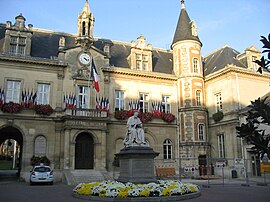Election of Mother Claude Marie Dauvaine 1647.
The respectable Mother Claude Marie Dauvaine being then deposited in our Monastery of Pont-à-Mousson, these dear Sisters granted permission to elect her to our redoubled entreaties; which we did with a unanimous voice on July 26, 1647. Scarcely was she in our house, when she applied herself with particular attention to discovering by what means she could extricate her from the extreme poverty to which she was reduced. She had recourse to the heavenly Father by fervent prayers and prayers; they were effective, for although she did not complain or speak to anyone about our miseries, God willed that the Most Honored Mother Françoise Jéronime de Villette should learn something about them, and be extremely touched by it. She was then governing our Monastery of Melun, and immediately charity suggested ways to help us, and she wrote to our Most Honored Mother the following letter:

Letter from Mother Françoise Jéronime de Villette.
“What! My intimate Sister, you suffer so much pain, and you say nothing about it; believe me that I am very sensitive to your ills, let us see, I beg you, what we can do for your relief. I have thought of one thing, I do not know whether it will be able to accommodate you; it is that as we do not have the means to give you a sum considerable enough to get you out of your embarrassment, if we were to send you two of our sisters, who of their good will would go to your monastery, we would give them their dowries and their small furniture; Maybe that way you would be a little relieved.”
Two sisters from Melun were sent with their dowries.
Our dear Mother replied with a feeling of perfect gratitude, accepting with thanksgiving the offer made to her. Immediately the charitable Mother Françoise Jéronime de Villette gave her Community an account of the state of the house in Metz at recreation, asking if there was anyone charitable and generous enough to sacrifice herself, and the comforts of her house, to go and help the Sisters of Metz, carrying her dowry with her. This great Superior had a very great consolation in this meeting, seeing about 30 of her daughters stand up, and offer themselves with admirable charity for this act of dedication, so that she was embarrassed for the choice. Fate fell on our Very Honored Sisters Marie Angélique Fillacier and Claire Marie de Foissy: both of great virtue and gifted with good talents, which they made use of for the good of our House, to which they rendered great services. But in order to do all things with the requisite just considerations, it was decreed that if they should desire to return to their house of profession, they should be received there as before; that they could not be expelled from Metz without their consent and for just causes; and that as long as they remained there, they would be considered as professed of this house. All these conditions were approved and accepted by both Communities.
All things concluded, these dear pilgrims left Melun, accompanied by Mademoiselle Joly, from the same city, who had the courage to leave her land and her relatives, to be a pretender in this House, wanting to share with our Sisters the glory, or rather the happiness of sacrificing herself for charity. She succeeded and was named Sister Marie Jéronime; she has rendered good service, her embroidery and painting work still speaks of her. They stopped as they passed through our Monastery of Pont-à-Mousson, where the Most Honored Mother Jeanne Françoise de Saint-Vincent, and her entire Community, received them with an affection and cordiality that went as far as respect, so much were they penetrated by the greatness of this act of devotion, produced by the admirable union of our holy Institute. They were kept for eight days to relieve them a little from the fatigue of so long and painful a journey. They finally arrived at Metz on August 12, 1652; it is easier to understand than to express, with what joy and gratitude they were received; we considered them as angels whom Heaven sent to our aid, and God, blessing their charity, made them taste so many sweetness and consolations, that they said they were surprised, and that, having disposed only to experience all kinds of misery, they found on the contrary everything beautiful and good, even the very poor meats, and the rather disgusting preparations that were presented to them; they found them delicious, saying that they had experienced nothing similar in France. Their dowries were used to pay some sums of money borrowed at high interest; this was a great relief for us; but it did not prevent us from being obliged to continue the painful cleaning of the sheepfold, nor the manufacture and dyeing of the fabrics necessary for our clothes; all the shoes were also made with joy and holy joy.